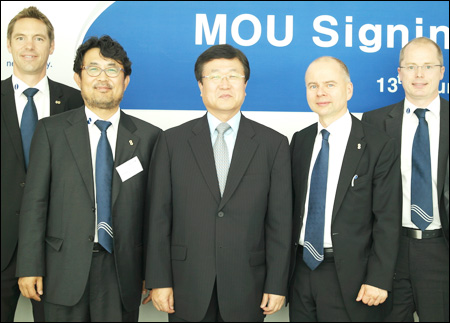Samsung SDI strikes energy deal in Germany

Samsung SDI CEO Park Sang-jin, center, poses with KACO CEO Ralf Hofmann, fourth from left, and other Samsung and KACO executives after the companies signed an MOU for business cooperation in various ESS solutions in Munich, Germany, Wednesday. / Courtesy of Samsung SDI
Samsung SDI, said Wednesday that it signed a memorandum of understanding (MOU) with German-based KACO for the cooperation of mutually-interested businesses and to supply SDI’s fine-tuned energy storage system (ESS) solutions.
The agreement came during SDI’s CEO Park Sang Jin’s participation of an industry forum in Munich, Germany. Under the MOU, Samsung SDI will supply ESS battery modules to KACO. With the SDI technologies, KACO will add its power conditioning system (PCS) as a last step before shipping to its clients, SDI said in a statement.
KACO’s ESS solutions using SDI technologies will be released in Europe from the latter half of this year with two levels ― 5.8 kilowatt for households and 100 kilowatt for industrial use.
“The latest deal will help SDI bolster our presence in Europe’s growing ESS market. We believe KACO will guarantee its product competitiveness by using Samsung technologies,’’ said Seo Hae-su, a spokesman for Samsung SDI.
KACO is the world’s second-biggest manufacturer of inverters for solar cells. Headquartered in Germany, it has distribution and sales channels in nine countries, SDI said.
ESS solutions are emerging as the alternative to better manage the electricity produced from solar cells and windmills after a growing number of European countries are cutting their support for feed-in tariff (FIT), SDI officials said.
SDI expects the demand for lithium-ion-based ESS solutions to grow over 150 percent, annually, throughout 2020 thanks to the industry’s new trend.
Last year, SDI sealed AES energy Storage to develop and deploy multi-megawatt energy storage systems to increase the capacity, improve responsiveness and enhance the efficiency of electric grids. <The Korea Times/Kim Yoo-chul>





















































